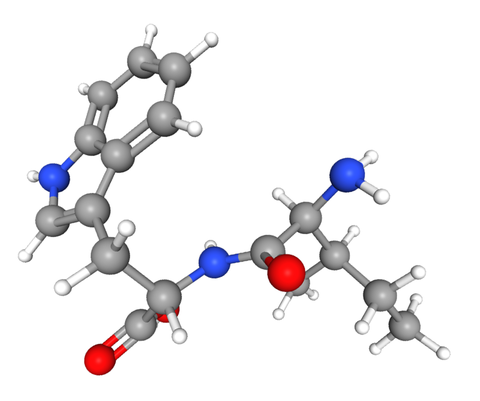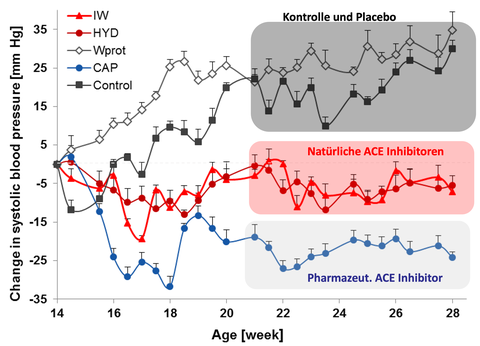Bioactive Peptides
Arterial hypertension is the leading risk factor for cardiovascular disease, which remains the number one cause of death worldwide. Hereditary factors, but also personal lifestyle, contribute to the development of hypertension, with insufficient exercise, an unhealthy diet, obesity and stress in particular being primary risk factors (Robert Koch-Institut. Epidemiologisches Bulletin 5/2015).
In addition to medication, lifestyle changes are one of the standard treatments for hypertension. In the phase of so-called prehypertension (blood pressure values between 130-139/85-89 mm Hg), this is also the sole recommendation. In the early stage of permanently elevated blood pressure values, drug treatment is not recommended, partly due to the side effects [Tao et al., Int J Cardiology, 2017].
Lifestyle-associated factors, such as physical activity, weight reduction and dietary measures, can significantly reduce the development of essential hypertension. Preventive measures such as dietary interventions are therefore increasingly becoming the focus of hypertension research.
Of particular interest are natural bioactive peptides, especially the tryptophan-containing dipeptides isoleucine-tryptophan (IW) and tryptophan-leucine (WL). These can be obtained by the directed enzymatic degradation of the protein alpha-lactalbumin contained in whey and are characterized by a strong angiotensin-converting enzyme (ACE)-inhibiting effect.
IW is particularly important here due to its very potent inhibition in vitro (IC50 concentration of 0.7 ± 0.3 µM, which is necessary for a 50% inhibition of activity) [Martin et al. J Agric Food Chem. 2008]. Although the dipeptide IW is subject to individually varying degrees of degradation in plasma, it had the strongest inhibitory effect on ACE activity in human plasma of all dipeptides obtained from food proteins [Khedr et al. J Hypertens. 2015; Michelke et al. J Funct Foods. 2017].
Feeding studies with rats (in the so-called spontaneously hypertensive rat model - SHR) showed that the increase in blood pressure that normally occurs in these animals could be prevented by ingesting IW [Figure; Martin et al. Acta Physiol, 2015].
In addition, an improved cardiovascular function of the treated animals could be determined by the intake of IW [Martin et al. Acta Physiol, 2015; Khedr et al. Eur J Nutr. 2017].
In order to discuss a potential application in humans, the bioavailability of IW had to be clarified in human studies. As in the animal studies, the intact uptake of IW in plasma and a dose-dependent reduction in plasma ACE activity were determined [Martin et al. Eur J Nutr. 2020]. However, these studies also showed that the resulting peptide concentrations in plasma are far too low to explain the detectable ACE inhibition (in plasma) solely by direct inhibition.
In the following, further animal and human studies should lead to the elucidation of the site of action of IW. This is necessary in order to clearly elucidate the mechanism of action for IW and to generate optimized antihypertensive foods based on this knowledge.
- Martin M*, Hagemann D*, Nguyen TT, Schwarz L, Khedr S, Moskopp ML, Henle T, Deussen A. Plasma concentrations and ACE-inhibitory effects of tryptophan-containing peptides from whey protein hydrolysate in healthy volunteers, Eur J Nutr 59, 1135–1147 [*contributed equally to this work] (2020).
- Martin M, Deussen A. Effects of natural peptides from food proteins on angiotensin converting enzyme activity and hypertension, Critical Reviews in Food Science and Nutrition 59 (8), 1264–1283 (2019).
-
Michelke L, Deussen A, Kettner K, Dieterich P, Hagemann D, Kriegel TM, Martin M. Biotechnological production of the angiotensin-converting enzyme inhibitory dipeptide isoleucine-tryptophan. Eng. Life Sci. 2018. 18, 218–226 (2018).
-
Michelke L, Deussen A, Dieterich P, Martin M. Effects of bioactive peptides encrypted in whey-, soy- and rice protein on local and systemic angiotensin-converting enzyme activity. Journal of Functional Foods. 2017. 28:299–305 (2017).
- Khedr S, Deussen A, Kopaliani I, Zatschler B, Martin M. Effects of tryptophan-containing peptides on angiotensin converting enzyme activity and vessel tone ex vivo and in vivo. Eur J Nutr 57(3), 907-915. doi 10.1007/s00394-016-1374-y (2017).
- Martin M, Kopaliani I, Jannasch A, Mund C, Todorov V, Henle T, Deussen A, Antihypertensive and cardioprotective effects of the dipeptide isoleucine-tryptophan and whey protein hydrolysate. Acta Physiol (Oxf) Aug 22. doi: 10.1111/apha.12578 (2015).
-
Khedr S, Martin M, Deussen A. Inhibitory Efficacy and Biological Variability of Tryptophan Containing Dipeptides on Human Plasma Angiotensin Converting Enzyme Activity. J Hypertens 4: 198. doi:10.4172/2167-1095.1000198 (2015).
-
Martin M, Wellner A, Ossowski I, Henle T. Identification and quantification of inhibitors for Angiotensin-converting enzyme in hypoallergenic infant milk formulas. J Agric Food Chem. 6333-6338. doi: 10.1021/jf800865b (2008).


